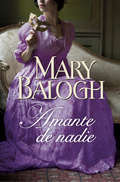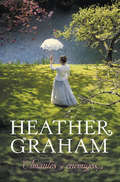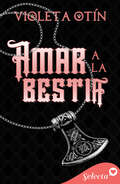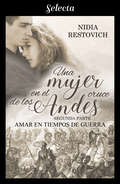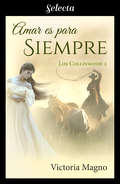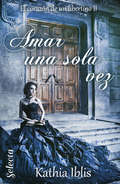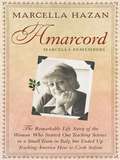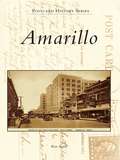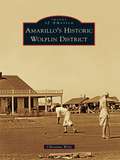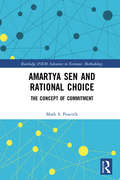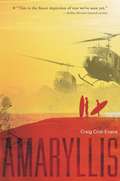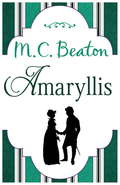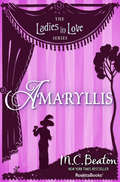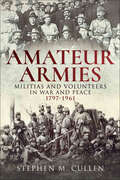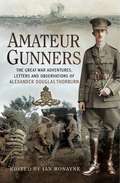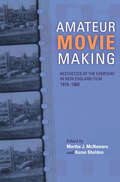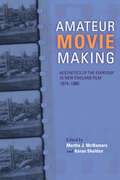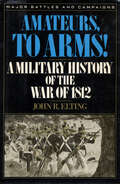- Table View
- List View
Amando a mi malvado canalla
by Dawn BrowerCuando Lady Francesca Kendall se encuentra en una situación delicada, tiene que tomar una decisión, y nada parece estar bien. En lugar de discernir lo que debe hacer por sí misma, llama a Matthew Grant, el duque de Lindsey, y descarga sus problemas en él, esperando que haga lo más caballeroso y asuma la responsabilidad del dilema que ha ayudado a crear.
Amante de nadie (Amantes #Volumen 2)
by Mary BaloghLa cautivadora historia de una rivalidad convertida en una irresistible atracción. La segunda entrega de la serie «Amantes». Viola Thornhill jamás se hubiera imaginado que se cumpliría la predicción de aquella gitana: «Cuidado con un forastero alto, guapo y de oscuro...» Creía haber encontrado la paz en Pinewood Manor, la casa que le legó el difunto conde de Bamber, cuando lord Ferdinand Dudley viaja al pueblo con el propósito de tomar posesión de esa misma propiedad, pues se la ganó a las cartas al joven conde de Bamber. Ninguno de los dos está dispuesto a renunciar a lo que consideran suyo, y se embarcan en una convivencia que les deparará muchas sorpresas... Todo se complica con la llegada del duque de Tresham, hermano de Ferdinand, quien no tarda en reconocer a Viola y desvelar su escandaloso pasado. Reseña:«Los personajes carismáticos y el ritmo ágil mantendrán a los aficionados a la novela romántica en vilo.»Publishers Weekly
Amantes secretos
by S. F. TaleUn reencuentro inesperado y unos amigos entrometidos propiciarán que una joven pareja una para siempre su destino. La señorita Laurel Hemlock tiene un gran problema: dar cumplimiento a las últimas voluntades de su padre. Con la inestimable ayuda de la mejor amiga de su madre, lady Susan, lo intentará. Así asistirá a esas fiestas que siempre rehuyó y en donde los solteros se interesan en ella por la fortuna de su familia. El único respiro que tiene son los recuerdos del último verano que hacen evadirse en la ilusión del amor. ¿Los mejores maridos son los libertinos reformados? Nathaniel Longmann tiene una vida tranquila que transcurre entre su trabajo, sus salidas a White´s y a alguna que otra fiesta en las cuales no se muestra interesado por ninguna mujer. Unos años atrás era considerado un libertino como su mejor amigo, el conde de Sanford-Thorne. Pero su última correría, transcurrida en el último verano, le ha dejado una marca imborrable en su corazón. No se considera un hombre celoso pero cuando ve a la mujer que le ronda la cabeza bailar con todos los caballeros, ¿hasta dónde estaría dispuesto a llegar por ella? A veces, para salvar el corazón hay que revelar su secreto mejor guardado.
Amantes y enemigos (Trilogía de los hermanos Cameron #1)
by Heather GrahamLa guerra les separó, pero un destino cruel les ha unido. Son enemigos y, sin embargo, no pueden evitar que la atracción y la pasión renazcan de nuevo... Vehemente y orgullosa, Kiernan es una mujer leal. Leal al Sur y a un estilo de vida que ahora ve desaparecer. Pero también es una mujer enamorada desde la infancia del primogénito de una gran plantación de Virginia que decidió unirse al Norte y luchar contra los suyos cuando el país se partió en dos. Y ella decidió olvidarle, pelear contra él y odiarle para siempre. Valiente, testarudo y enormemente atractivo, el coronel Jesse Cameron viste ahora el uniforme azul del ejército yanqui. También es el hombre que entregó tiempo atrás su corazón a una joven hermosa y rebelde. Pero eso fue antes de que la guerra lo cambiara todo, antes de que su país se partiera en dos, antes de que ella jurara olvidarle, pelear contra él y odiarle para siempre. Primera entrega de una trilogía ambientada en la guerra de Secesión y protagonizada por los hermanos Jesse, Daniel y Christa Cameron.
Amar Akbar Anthony: Bollywood, Brotherhood, and the Nation
by William ElisonThe 1977 blockbuster Amar Akbar Anthony about the heroics of three Bombay brothers separated in childhood became a classic of Hindi cinema and a touchstone of Indian popular culture. Beyond its comedy and camp is a potent vision of social harmony, but one that invites critique, as the authors show.
Amar a la Bestia
by Violeta OtínNo hay cadenas que puedan atar al destino. La princesa Gweldyr de Demetia nunca ha deseado dejar atrás las seguras murallas que protegen su hogar. Allí es feliz y allí se encuentra todo cuanto ama. Pero cuando su padre la promete al poderoso rey de Buellt para sellar una valiosa alianza, su mundo se rompe en pedazos. Lo único en lo que puede pensar es en el terror que le provoca traspasar las murallas. El tuerto. La bestia. El capitán de la guardia de Buellt apenas recuerda que una vez tuvo un nombre. Al mando de un grupo de mercenarios, solo le preocupan dos cosas: evitar que los sajones crucen la frontera y que las reservas de bebida le duren, al menos, un día más. La última tarea que le han encomendado, escoltar a la prometida del rey, no parece digna de alguien como él. Acostumbrado a la soledad y al remordimiento, le cuesta entender por qué la asustadiza princesa de los démetas parece encontrar consuelo en compañía. Y,en cualquier caso, ¿cómo podría nadie tratar de entrometerse en el camino del rey? Pero las hilanderas del destino ya han comenzado a tejer sus nombres, y nadie, ni siquiera él, puede escapar de sus redes.
Amar en tiempos de guerra (Una mujer en el cruce de los Andes #Volumen 2)
by Nidia RestovichÚltima entrega de la bilogía «Una mujer en el cruce de los Andes» de Nidia Restovich. Amor y pasión tendrán cabida en un ambiente de batallas y luchas encarnizadas por la independencia de Chile. «Quisiera que pudiese entrar en mi mente y verse a través de mis ojos para que entendiese la magnitud de mi amor, la amo tanto, tanto... que a veces me duele.» Octubre de 1817. Santiago de Chile. Hace tres meses que el capitán Jhon Williams se ha marchado a combatir en el fuerte de Talcahuano y Mercedes está decidida a mantenerse alejada de la prohibida tentación que él representa para ella, pero nuevos acontecimientos los harán reencontrarse. A partir de allí, más allá de la culpa y los tabúes religiosos y morales, ninguno de los dos podrá escapar del tormentoso deseo que sienten el uno por el otro. En medios de las victorias y derrotas, de los feroces y encarnizados combates para lograr concretar el sueño de la libertad e independencia de Chile, esa fuerte atracción se convertirá en un amor sin barreras que los arrastrará por los tortuosos caminos de la guerra y la pasión. A partir de allí, todo será posible.
Amar es para siempre (Los Collinwood #Volumen 2)
by Victoria MagnoVuelve la serie «Los Collinwood» con esta segunda y apasionante entrega. Entre la Inglaterra victoriana y un rancho perdido en mitad de México todo puede pasar... NOVELA FINALISTA DEL III PREMIO VERGARA Alissa es una hermosa joven que al parecer lo tiene todo: pertenece a la nobleza británica, su padre es rico y la adora, tiene muchos pretendientes y el hombre al que ama desea casarse con ella. Sin embargo, su vida cambiará inesperadamente. La aristocracia obliga a Alissa y Matthew a ocultar su amor. Por eso Matthew debe volver a México para convertirse en el hombre adecuado para Alissa: ser rico y construir una casa son dos de sus metas. No obstante, una tragedia les espera. ¿La envidia destruirá sus planes? ¿Sobrevivirá el amor de los jóvenes? ¿La crueldad de la sociedad logrará separarlos?Una historia apasionante que te atrapará desde las primeras páginas.
Amar una sola vez (El corazón de un libertino #Volumen 2)
by Kathia IblisLlega la segunda entrega de «El corazón de un libertino». Una historia ambientada en inglaterra de la época victoriana que comenzó con Un amor inesperado. El destino hará que los caminos de los protagonistas se crucen, pero los oscuros secretos del pasado harán que salga a la luz lo que ambos son capaces de hacer por el otro. Urania Forrester Cabot, americana y hermana mayor de Calíope, huye de Boston en medio de la noche en misteriosas circunstancias. Aprovechando la futura boda de su hermana menor como excusa, busca un nuevo comienzo al otro lado del océano, lejos de la pesadilla en la que se ha convertido su vida, aunque negada al amor. Byron Hunttington, tras un doloroso hecho que lo obligó a jurar nunca más retornar a su país, se ve forzado a volver a Inglaterra para cumplir con los deberes del título que heredó. No obstante, al regresar, el rescate a una dama en apuros hace que su corazón vuelva a latir. Nada será tan fácil y solo el amor sincero será el arma que les permitirá vencer.
Amar una sola vez (El corazón de un libertino #Volumen 2)
by Kathia IblisLlega la segunda entrega de «El corazón de un libertino». Una historia ambientada en inglaterra de la época victoriana que comenzó con Un amor inesperado. El destino hará que los caminos de los protagonistas se crucen, pero los oscuros secretos del pasado harán que salga a la luz lo que ambos son capaces de hacer por el otro. Urania Forrester Cabot, americana y hermana mayor de Calíope, huye de Boston en medio de la noche en misteriosas circunstancias. Aprovechando la futura boda de su hermana menor como excusa, busca un nuevo comienzo al otro lado del océano, lejos de la pesadilla en la que se ha convertido su vida, aunque negada al amor. Byron Hunttington, tras un doloroso hecho que lo obligó a jurar nunca más retornar a su país, se ve forzado a volver a Inglaterra para cumplir con los deberes del título que heredó. No obstante, al regresar, el rescate a una dama en apuros hace que su corazón vuelva a latir. Nada será tan fácil y solo el amor sincero será el arma que les permitirá vencer.
Amarcord
by Marcella HazanWidely credited with introducing proper Italian food to the English-speaking world, Marcella Hazan is known as America's godmother of Italian cooking. Raised in Cesentatico, a quiet fishing town on the northern Adriatic Sea, she'd eventually have her own cooking schools in New York, Bologna, and Venice, where she would teach students from around the world to appreciate-and produce-the homemade pasta, rustic soups, deeply satisfying roasts and stews, pure seafood dishes, and the fresh vegetables dressed with olive oil that Italians eat. She'd write bestselling and award-winning cookbooks, and collect invitations to cook at top restaurants around the world. She would have thousands of loyal students, and readers so devoted they'd name their daughters Marcella. Her fans will be as surprised and delighted b how all this came to be as Marcella herself has been. Marcella's story begins not in Italy but in Alexandria, Egypt, where she spent her early childhood and where she fell on the beach and broke her arm-an accident that would hardly register for a child today, but which altered the course of her life. After nearly losing her arm to poor medical treatment, she was taken back to her father's native Italy for surgery. There the family would remain. Her teenage year coincided with World War II and the family relocated temporarily to Lake Garada, which they, not they, not anticipating that it would become one of war's greatest targets when both Mussolini and German High Command established their headquarters there, thought would be a safe haven. After years of privation and nightly bombings, Marcella was finally Fulfilling her ambition to become a doctor and professor of science when she Victor, the love of life. After their marriage, they moved to America, where Marcella knew not a word of English or-what's more surprising-a single recipe. She began to recall and attempt to re-create the flavours of her homeland. After women with whom she took a Chinese cooking class in the early sixties asked her to teach them Italian cooking, she began to give them lessons in her tiny New York kitchen. Soon after, Craig Claiborne invited himself to lunch, and the rest is history. Amacord means 'I remember' in Marcella's native Romangolo dialect. In these pages, Marcella, now eighty-four, looks back on the adventures of a life lived for pleasure and a love of teaching. Throughout, she entertains the reader with stories of the humorous, sometimes bizarre, twists and turns that brought her love, fame, and a change to forever change the way we eat.
Amarillo
by Ron SmithMany people are surprised to learn that the city of Amarillo was actually founded twice. Originally settled by J. T. Berry in April 1887 and known as Oneida, the site of the town was located on such low ground that many residents feared it was susceptible to flooding. In 1888, one concerned resident named Henry B. Sanborn began buying land a mile east of the site as a potential place to relocate the town. In 1889, the town's fears came to fruition when heavy rains flooded the original town site, prompting residents to move to Sanborn's new location. The town went on to become one of the world's busiest cattle shipping points in the late 1890s, causing its population to grow significantly. Today Amarillo is the largest city in the Texas Panhandle, and its economy continues to thrive on cattle, along with agriculture, oil, and natural gas.
Amarillo's Historic Wolflin District
by Christine WylyIn September 1887, J. T. Berry bought 640 acres of school land from the State of Texas. Several years earlier, this raw section of prairie had been home to buffalo herds and the Kiowa and Comanche Nations. Berry could not have known that this land would one day become home to cattle barons, oil and gas pioneers, and a U.S. ambassador. When Charles Oldham Wolflin married Alpha Eunice McVean a decade later and acquired that same section of land, he never dreamed that his son would develop that land from a dairy farm into a premier residential development. Today the Wolflin Historic District is a vibrant, lush neighborhood with tree-lined brick streets and stately houses. It is home to several thousand residents, including descendants of pioneer families, modern-day professionals, and public servants who contribute to the arts, are involved in philanthropy, and are active in community service.
Amartya Sen and Rational Choice: The Concept of Commitment (Routledge INEM Advances in Economic Methodology)
by Mark S. PeacockAre human beings motivated exclusively by self-interest? The orthodox theory of rational choice in economics thinks that they are. Amartya Sen disagrees, and his concept commitment is central to his vision of an alternative to mainstream rational choice theory. This book examines commitment as it has evolved in Sen's critique of orthodox rational choice theory. The in-depth focus on commitment reveals subtleties in the concept itself as well as in its relationships with other concepts which Sen develops in his critique of rational choice theory, for example preference, sympathy, weakness of will, agency, personhood, social norms, rights, self-welfare goal and self-goal choice. The book provides a comprehensive understanding of commitment and offers novel interpretations of the term as a way of strengthening its plausibility. Broadly in support of Sen’s conceptualization of rational choice, the book nevertheless reveals ambiguities and weaknesses in Sen’s conceptual framework, and it reformulates Sen’s concepts when doing so strengthens the claims he makes. The book also engages with critics of Sen and argues for the importance of commitment as a component in the theory of rational choice.
Amaryllis
by Craig Crist-Evans"This is a powerful tale of family, forgiveness, and acceptance of what life throws in our paths- but ultimately, with its almost painful realism, this is the finest depiction of war we've yet seen for young readers." -- KIRKUS REVIEWS (starred review) AMARYLLIS. It was the name of the ship that ran aground on Singer Island, Florida, during a hurricane in 1965. It became a battle cry for Jimmy Staples and his older brother, Frank, and a code word for going surfing together. But now that eighteen-year-old Frank is off battling the enemy (and his own addictive demons) in Vietnam and fifteen-year-old Jimmy is left to deal with the repercussions at home, "Amaryllis" takes on an ominous new meaning - a symbol of what happens when life places the unexpected in our paths. Craig Crist-Evans has written a wrenching novel of a family whose internal battles chase one son away - into the clutches of a war and an enemy he could never have imagined. Told both from a soldier's view and by the brother he leaves behind, Amaryllis is an ideal choice for students learning about the Vietnam era, or for any reader curious about the reality of war.
Amaryllis (Ladies in Love #1)
by M.C. BeatonOnce Miss Amaryllis Duvane had been the reigning beauty of the London season, about to marry the man of her dreams and live and love happily ever after.Then her father died. Suddenly Amaryllis was penniless and alone, forced to survive on the charity of relatives who made her little more than a servant to their husband-hunting daughters.Now the lord that Amaryllis had once loved - the magnificently handsome Marquess of Merechester - had come to court one of these daughters. And the only thing Amaryllis feared more than his discovering the sad state to which she had descended, was her finding out that she still wanted him so much . . .
Amaryllis (The Ladies In Love Series #8)
by M. C. BeatonWhen London’s reigning beauty suddenly loses everything, she must pine in secret for the Marquess she loves in the beloved author’s Regency Romance.Amaryllis Duvane is the belle of the London Season: a Diamond of the First Water, desired by every man and envied by every woman. Even better, she’s about to marry the devastatingly handsome Marquess of Merechester. But when her father dies, Amaryllis loses more than a parent. She loses her fortune, her standing among the ton . . . and her happily ever after.Forced to depend on the generosity of rich relations, Amaryllis must work as a servant to her own socially ambitious cousins. When her ex-fiancé starts courting one of her relatives, she can’t bear the thought of him seeing what’s become of her—or how much she still desires him.Amaryllis was originally published as The Poor Relation.
Amarás a un extraño
by Kathleen WoodiwissAmarás a un extraño es una novela de pasiones encendidas y obsesiones inconfesables, magníficamente ambientada en el siglo XIX en una mansión sureña de Estados Unidos. Para el apuesto Asthon aquella mujer milagrosamente reencontrada era su adorada Lieren, la esposa perdida en un accidente de navegación, la mujer que le había enseñado el arrebato del amor verdadero en una breve luna de miel cruelmente interrumpida. Sin embargo, para otro hombre, aquella mujer era Lenore, la esposa que él había arrastrado a través de una pesadilla de oscuras pasiones y muerte. ¿Quién era en realidad aquella mujer subyugante que, confundida y temerosa, no recordaba su propia identidad y mucho menos la de los dos hombres que se la disputaban en calidad de maridos?...
Amateur Armies: Militias and Volunteers in War and Peace, 1797–1961
by Stephen M. CullenA history of volunteer armies spanning from the French Revolutionary Wars and the War of 1812 to pre-1914 Ireland and the Bay of Pigs.Amateur Armies examines the military and social history of volunteer armies around the western world from the failed French invasion of South Wales in 1797 to the disastrous anti-Communist invasion of the Bay of Pigs in Cuba in 1961.It brings together some fascinating military actions across more than a century and a half of history and explores the social and political context in the countries involved. Stephen Cullen’s absorbing and original book is the first general survey of the role of amateur armies during the period.Included are chapters on a series of wars in which militias played critical parts. In each case, their actions and effectiveness are described as is the background from which they came, and the social and political circumstances in which they operated. This pioneering study offers a valuable insight into each of the amateur armies covered and opens up an important and hitherto neglected aspect of military history.
Amateur Gunners: The Great War Adventures, Letters and Observations of Alexander Douglas Thorburn
by Ian RonayneAfter training at St John's Wood in London and in Exeter, Alexander Douglas Thorburn was posted to the BEF in France, joining the 2/22nd London (Howitzer) Battery, Royal Field Artillery as a subaltern officer. After service in the Vimy Ridge sector, with his division, the 60th (2/2nd London) Division, he crossed the Mediterranean to join the British Army in Salonika. Following a further move in mid-1917, Thorburn arrived in Palestine where he saw service with the 74th (Yeomanry) Division during the advance on Jerusalem. A final move in 1918 took the now Captain Thorburn back to the Western Front to take part in the Advance to Victory during the closing months of the war. After the war, Thorburn wrote an account of his military service between 1916 and 1918, recording his experiences in France, Greece and Palestine as well as his initial training in England. He also wrote a series of observations on life as a gunner during the First World War. Both the account and observations were published as a book, Amateur Gunners, in 1933 by William Potter of Liverpool. Today, the book is out of print. In addition to the book, of which a small number of copies still exist of course, there are an extensive series of private letters written by Thorburn while on active service to his mother, father and other relatives. The letters are in the possession of Thorburn's only grandson. Together, the book and letters offer a fascinating insight into the life of a First World War artillery officer. Lucidly written in a candid style, Thorburn shows excellent observation, description and narration skills. While Amateur Gunners itself is worthy of reprint, when combined with Thorburn's private letters and historical context from author Ian Ronayne, this book offers a unique look at a gunner's experience during the Great War.
Amateur Movie Making, Enhanced eBook: Aesthetics of the Everyday in New England Film, 1915-1960
by Alice T. Friedman Karan Sheldon Martha J. McNamaraA compelling regional and historical study that transforms our understanding of film history, Amateur Movie Making demonstrates how amateur films and home movies stand as testaments to the creative lives of ordinary people, enriching our experience of art and the everyday. Here we encounter the lyrical and visually expressive qualities of films produced in New England between 1915 and 1960 and held in the collections of Northeast Historic Film, a moving image repository and study center that was established to collect, preserve, and interpret the audiovisual record of northern New England. Contributors from diverse backgrounds examine the visual aesthetics of these films while placing them in their social, political, and historical contexts. Each discussion is enhanced by technical notes and the analyses are also juxtaposed with personal reflections by artists who have close connections to particular amateur filmmakers. These reflections reanimate the original private contexts of the home movies before they were recast as objects of study and artifacts of public history.
Amateur Movie Making: Aesthetics of the Everyday in New England Film, 1915–1960
by Alice T. Friedman Karan Sheldon Martha J. McnamaraA compelling regional and historical study that transforms our understanding of film history, Amateur Movie Making demonstrates how amateur films and home movies stand as testaments to the creative lives of ordinary people, enriching our experience of art and the everyday. Here we encounter the lyrical and visually expressive qualities of films produced in New England between 1915 and 1960 and held in the collections of Northeast Historic Film, a moving image repository and study center that was established to collect, preserve, and interpret the audiovisual record of northern New England. Contributors from diverse backgrounds examine the visual aesthetics of these films while placing them in their social, political, and historical contexts. Each discussion is enhanced by technical notes and the analyses are also juxtaposed with personal reflections by artists who have close connections to particular amateur filmmakers. These reflections reanimate the original private contexts of the home movies before they were recast as objects of study and artifacts of public history.
Amateurs and Professionals in Post-War British Sport (British Politics and Society)
by Adrian Smith Dilwyn PorterThe pressures and demands of professionalism and commercialization have transformed Britain's sports. At the end of the 20th century sports have been packaged and marketed as mass entertainment for a national or even international audience. This volume explores different facets of this phenomenon.
Amateurs, to Arms!: A Military History of the War of 1812 (Major Battles and Campaigns)
by John R. EltingBegun in ignorance of the military reality, the War of 1812 was our "most unmilitary war," fought catch-as-catch-can with raw troops, incompetent officers, and appallingly inadequate logistics. American soil was invaded along three frontiers, thte nation's capital was occupied and burned, and the secession of the New England states loomed as a possibility. In Amateurs, to Arms! distinguished military historian Colonel John R. Elting shows how the young republic fought and almost lost its "Second War for Independence," and how it was saved by the handful of amateur soldiers and sailors who survived, masters their deadly new professions, and somehow battled Great Britain to a standstill along our wilderness borders and on the high seas.
Amateurtheaterprojekte zu Holocaust und Nationalsozialismus: Eine qualitative Studie zur Erinnerungskultur im 21. Jahrhundert (Holocaust Education – Historisches Lernen – Menschenrechtsbildung)
by Lisa SchwendemannIn diesem Buch wird das Rezeptionsverhalten von Zuschauer(inne)n erforscht, welche Amateurtheaterprojekte zu ‚Holocaust und Nationalsozialismus‘ besuchen. Die Studie ist qualitativ angelegt, indem Interviews mit Hilfe der Grounded Theory ausgewertet werden. Es wird der Frage nachgegangen, welcher Personenkreis von Amateurtheaterprojekten angesprochen wird, wie diese Projekte von den Theaterbesucher(inne)n wahrgenommen werden und welche Wirkungen die Rezipient(inn)en während und nach dem Theaterbesuch an sich feststellen. Es kann herausgearbeitet werden, dass die in dieser Arbeit untersuchten Projekte eine intellektuelle Auseinandersetzung mit ‚schwieriger‘ Geschichte fokussieren. Die in den Amateurtheaterprojekten gewählte theatrale Darstellungsweise spricht tendenziell ein ‚bildungsnahes‘ Publikum an, das bereits über Vorwissen zur Thematik verfügt und bereit ist, sich während und nach dem Theaterbesuch aktiv mit ‚Holocaust und Nationalsozialismus‘ auseinanderzusetzen. Hierzu hat die Autorin ein Rezeptionsmodell herausgearbeitet, das die intellektuelle Auseinandersetzung mit ‚schwieriger‘ Geschichte umfasst.

